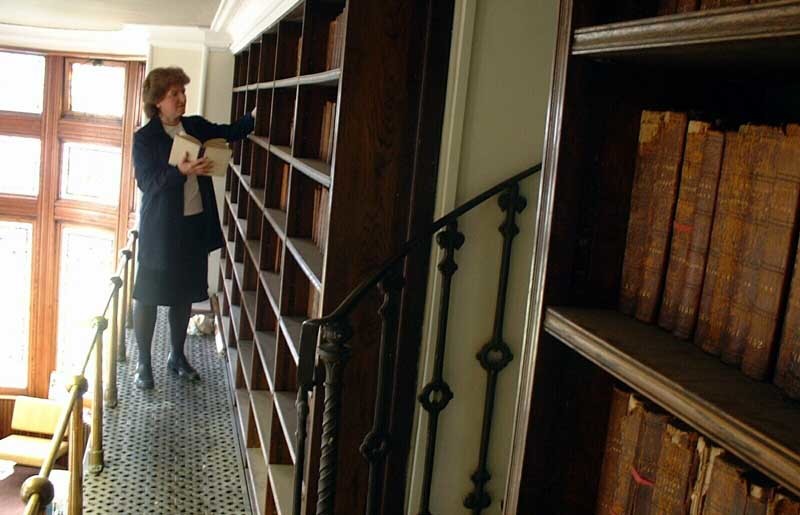An estimated 450 libraries and mobile services across Britain are facing closure as council cuts hit the reading and learning cornerstones of our communities. But library lovers including Courier writer Norman Watson are not throwing in the towel.
Libraries gave us power, according to bookworm rockers The Manic Street Preachers.
And they seem to. In 35 years of journalism I’ve lost count of the times politicians, business or civic leaders told me they learned their trade not at school, college or university, but by browsing in libraries.
For many, libraries have been a pathway to getting places. They change lives by providing information, offering advice, improving literacy, imparting skills, connecting people and allowing entry to the world of reading for those who don’t have books at home.
But some 150 years after Scotland’s first free public library was established in Dundee, where stand libraries now?
With Britain facing financial meltdown, councils are wielding the budget scimitar to slash away at services.
Libraries are soft targets every politician knows that so we have seen branch libraries close, opening hours cut, services withdrawn and budgets shrunk.
The trouble is, the public love libraries, and surprise, surprise according to the latest statistics for the UK, children’s fiction lending rose by 6%, children’s non-fiction by 1%, while adult fiction held steady, down by just 0.1%.
Scotland has 554 public libraries and 82 mobile libraries. Nearly all of Scotland’s 376 secondary schools have a library and professional librarian, as do our 20 universities and 43 colleges.30 million visitorsScottish public libraries attract almost 30 million visitors annually, and the number is on the increase. More than two million extra visits were made compared to two years ago, while library learning service use has soared by 14%.
More than one in five Scots still borrow books from a public library, and for nearly seven out of 10 reading for pleasure is their main participation in cultural activity.
So goodwill towards the service remains strong, and libraries are holding their own against the digital revolution.
The problem is their cost in relation to other services, such as care for the elderly, education or roads maintenance.
The Labour government’s review of libraries early last year produced a raft of ideas for delivering a “modernised” library service. This included more flexible hours, group activities, ebooks, coffee shops, volunteers even charging for admission.
They said, in effect, that libraries should move with the times.
Yet some of these themes were hardly new. The Royal Library at Alexandria had a cafe in the third century BC. Dundee and other major centres had food outlets on library premises before Harry Potter had left J. K. Rowling’s head.
They also had weekend and evening opening hours, and used the skills of volunteers in an official and unofficial capacity for many years though not where it might risk job substitution.
Lending books used to be what a library was about, and perhaps number crunchers look too often at the fall in lending percentages to assume libraries are ripe for pruning.
Yet the books-have-had-their-day brigade may yet have to retreat. A study reported recently by the New York Times showed a home PC offered little educational benefit, where a 500-book library at home would apparently “propel a child 3.2 years” in education.Above-averageAt the weekend, the National Literacy Trust published research showing children who use their local library were twice as likely to be above-average readers.
Even computer giants have been forced to concede that going digital is not the educational driver usually imagined. A survey by Hewlett Packard in June found that of 1000 consumers aged between 11 and 16, 95% still preferred printed books to digitised formats.
Today’s libraries are about more than books, however, they are places to store, conserve and consult our place in the world. They offer access to parish records, maps, plans, photographs, letters, diaries, ephemera, newspapers like this one and council minutes.
Libraries are also positioned at the heart of community life and have a social purpose. They support literary, leisure and learning through staff and services.
They are hubs where people can meet in a safe, politically neutral environment. They cater for a multitude of disadvantaged groups and provide a direction to a fairer society.
They improve literacy levels particularly among adults and their free access to knowledge offers many a first step on the path back into learning, or participation in lifelong learning.
They offer free broadband internet access for paying bills, or to search for jobs, or to learn how to use the web safely and securely, or for online inquiries. Some also provide support and information for small businesses.
They also cater for book groups and popular recreational activities, such as family history research.
These are some of the ways libraries fulfil their core purpose for groups of all ages. As one librarian put it to me, “We cater for the academic and the Dundee wifie.”
Policymakers eager to pare costs should be wary of viewing libraries as easy targets for cuts the public like them and with each closure or contraction a community is deprived of a free, safe, valued and valuable public space.
